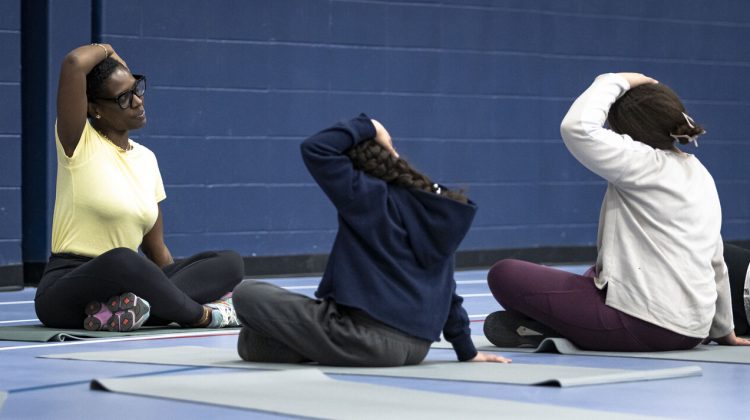On Friday, the Lynn Teen Drop-in Center partnered with Love Your Magic for a workshop that included a yoga session and a discussion and reflection on community violence. The event was held at the Lynn Vocational Technical Institute during an open gym event during students’ April vacation.
Ivanna Solano, the founder and Executive Director, mentioned that her organization has been in conversation with the city’s DEI director Faustina Cuevas to collaborate on how they can support the city’s youth.
“We know that there has been some violence in the city and so we want to really think about how do we support the wellbeing of our young people,” Solano said, “While also encouraging young people to think about ‘what are the root causes of why violence is happening?’ and then the role that they can play in shaping and envisioning a safer city.”
At the workshop, the students started with yoga, led by Marlene Boyette, a trauma-informed wellness practitioner, educator, and disrupter.
Boyette said that yoga was chosen to enhance the event’s message due to its main component of having a moment to be still, so that one can process and have deeper awareness of oneself and what’s happening around them.
“I think you know commonly, because of this society, because of this world we live in, which we’re constantly moving at a very fast pace, which in turn, separates us from many internal things,” Boyette said, mentioning that this can include that from our bodies, our natural rhythm of breath, and awareness of what’s happening around us.
Some of the exercises done during the yoga session included a grounding body scan, restorative postures, and the challenge of slowing down.
Solano said that after yoga, the students would engage in a conversation with her about what the principles of yoga taught them, how to use what they’ve learned from the session to address violence within the city, and what role they can play in creating a safer city and safer communities.
The students then read a series of statements to see how violence impacts young people, whether they realize it or not. With that, the students would be able to think about whether they feel safe in their neighborhoods and what their hopes for the future are.
Solano also mentioned that they’d be having an open discussion on systemic issues that contribute to violence, such as social and economic inequality, lack of access to opportunities, psychological factors, and structural factors at play.
Solano also highlighted the importance of transformative justice, which she defines as “approaching these issues with a community-first mindset.”
“So really wanting them to take a community-based approach and also thinking about how they can also have a role in shaping the city,” Solano said.
To end the event, Solano said that they’d have a discussion to push young people to reflect and take actions they can implement at home, at school, and in the community. They should also think about initiatives they can take and advocate for to really change their feelings about the city or its dealings with violence.
What Solano and Boyette both agreed upon and really enhanced through this workshop was the approach of making sure that the students could learn from the workshop and that anyone leaving could take home with them something they use whenever applicable and whenever needed.
“We find that it’s something that’s easy for them to apply into their lives. We want these to be skills that they learn and are able to build upon in their day to day lives,” Solano said.

